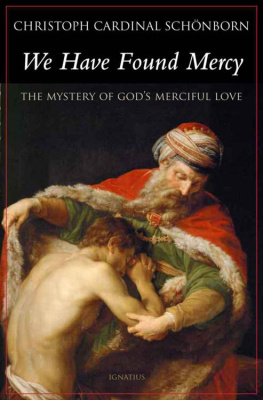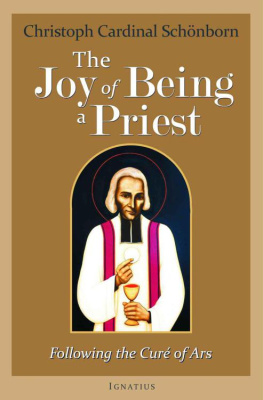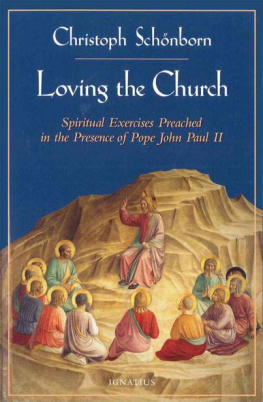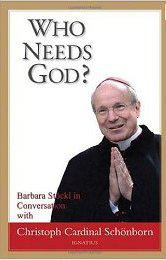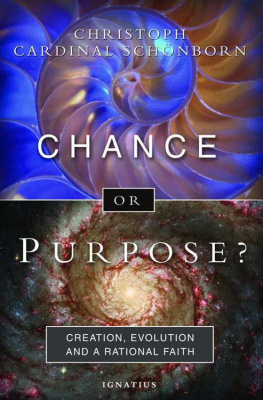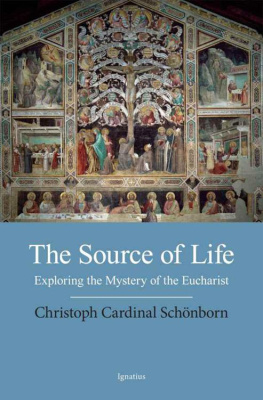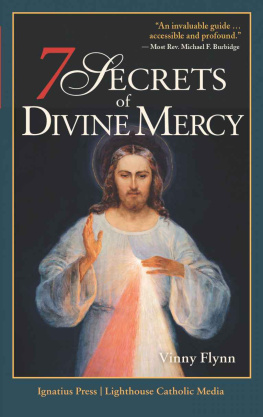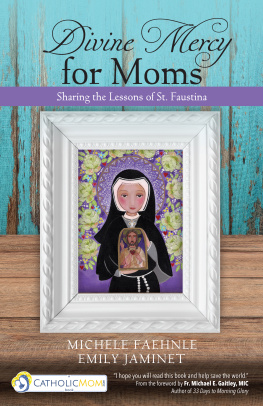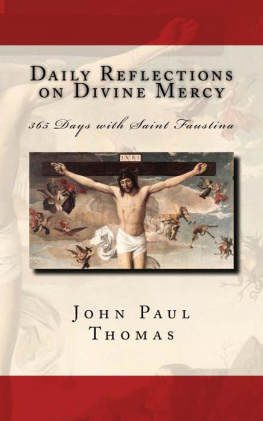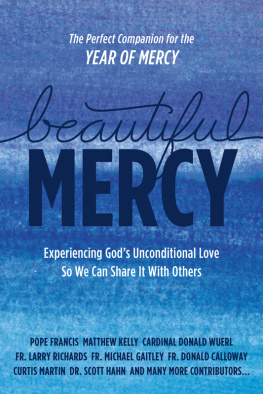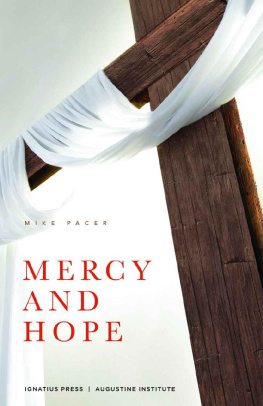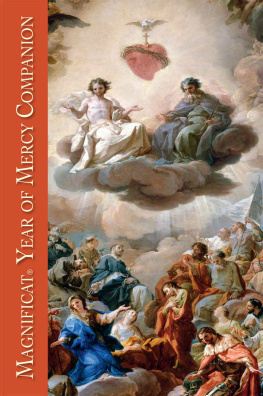WE HAVE FOUND MERCY
CHRISTOPH CARDINAL SCHNBORN
WE HAVE FOUND MERCY
The Mystery of Divine Mercy
Edited by Hubert Philipp Weber
Translated by Michael J. Miller
IGNATIUS PRESS SAN FRANCISCO
Original German edition:
Wir haben Barmherzigkeit gefunden:
Das Geheimnis des gottlichen Erbarmens
2009 by Verlag Herder GmbH,
Freiburg im Breisgau
Scripture citations are taken from the
Revised Standard Version, second Catholic Edition
Cover art:
The Return of the Prodigal Son
by Pompeo Batoni (1708-1787)
Kunsthistoriches Museum, Vienna, Austria
Erich Lessing / Art Resource, New York
Cover design by Roxanne Mei Lum
2012 by Ignatius Press, San Francisco
All rights reserved
ISBN 978-1-58617-415-6
Library of Congress Control Number 2011930702
Printed in the United States of America
Contents
Foreword by the Editor
In the First Letter to Timothy we read about Pauls conversion: I received mercy for this reason, that in me, as the foremost [of sinners], Jesus Christ might display his perfect patience (1 Tim 1:16). When Paul admonishes the readers of his letters, as he does so often, to take him as an example, then this is exactly what he means: All of us have found mercy, just as he did (cf. Rom 11:30-31; see also 1 Pet 2:10). Part of the mystery of the Divine Mercy is that it applies to all men and is vitally necessary for every individual. The message of Christianity is the message of Gods mercy. The world needs it today more urgently than ever, and the Church has the pressing task of proclaiming it.
At the same time, this talk about Gods mercy is often called into question. Is it not a sign of weakness to be dependent on mercy? How is it related to freedom? To whom will God show his mercy? Should we ourselves be merciful? Then what about justice? And what is mercy in the first place? Any proclamation of the faith must address all of these serious questions.
On the other hand, there are many examples of genuine, practical mercy in the Church and outside of her. The first World Apostolic Congress on Mercy was held in Rome, April 2-6, 2008. For four days there was an exchange of testimonies from all over the world about people who need Gods mercy and pass it on. Everywhere in the Church, in all parts of the world, a hunger and thirst for Gods mercy is evident. All over the world people are rediscovering Gods mercy. Perhaps the most impressive testimony of the Congress came from Immacule Ilibagiza, the sole survivor of a large family that perished in the genocide in Rwanda. Not only did she have to hide for ninety days in her bathroom; she also met the man who murdered her entire family. During her ordeal she kept the mercy of Jesus deep in her heart, which gave her the strength to be able to forgive that murderer. Today she shares with many people throughout the world her testimony to the reconciling and healing power of mercy.
Christoph Cardinal Schnborn, who helped significantly to organize the conference and presided over it, took the year of preparatory work as an occasion to give monthly catecheses on the Divine Mercy in the Cathedral of Saint Stephen in Vienna; those talks are published in abridged and revised form in the nine chapters of this book.
The catechetical journey begins with Pope John Paul II. At the center of his work, as he himself said many times, was the message of the Divine Mercy. In the midst of a world full of strife, sin, and suffering, he wanted to commend Gods mercy to all people. He gave to the Sunday after Easter, Whitsunday, the title of Divine Mercy Sunday. His devotion was shaped by the visions of the saintly nun Faustina Kowalska. Those visions will repeatedly play apart in the following chapters also.
The second chapter is devoted to the message of the Old Testament. The title The Wrathful and Merciful God already addresses the problem. For many people the Old Testament still amounts to dire news about a God of retaliation, whereas they find the good news about his love only in the New Testament. Anyone who studies Sacred Scripture carefully, however, will realize that the entire Old Testament is shaped by the love story of God and his people Israel.
The third chapter considers the mercy of Jesus. His care for the poor and the suffering makes Gods mercy something that can be experienced by everyone. And yet there can be no mercy without truth and justice. The Gospels often speak of this.
Jesus paid a high price for our salvation; he gave his life. The fourth chapter discusses this. It also shows the movement contrary to mercy: hardening of the heart, which inevitably leads to sin.
The fifth chapter recalls the Apostle Paul. He was on the path leading away from God and was overcome by Jesus. His vocation on the road to Damascus is the key experience that opened up for him the door to a new life. At the center of his thought stands the Cross of Jesus, which makes visible in a unique fashion the love of God for mankind.
The sixth chapter calls to mind the sacrament of mercy, confession. Many people today have become estranged from this wonderful gift of God. One reason for this, certainly, is the way in which the sacrament has been celebrated in practice. The focus has not always been on the consoling message of mercy. It is important to rediscover it, and the writings of Sister Faustina can be of help.
The catechetical tradition speaks about the works of mercy, and the seventh chapter is dedicated to them. The will of Jesus is done by all who follow his example. It is something fundamentally human to devote oneself to others and to use ones life for people. At the same time, throughout its history Christianity has again and again become an engine of mercy in the world.
The eighth chapter recalls Mary, the Mother of Jesus. Throughout the world Christians honor her as the Mother of Mercy. She invites us to follow her example, to allow ourselves as she did to be touched by Gods mercy and to become visible signs of Gods mercy for all people.
At the conclusion, in the ninth chapter, one of the most difficult questions of the Christian faith is discussed: At the end of the world, will there be mercy for all people? No doubt God wills that all men be saved. But can that happen without justice? And what about suffering in the world? Gods mercy for the world takes human freedom seriously. And yet it is greater than any petty, selfish human purpose, and this offer is always available to man.
Again and again in history we find a great number of witnesses to mercy, often simple people who quite naturally help us to experience mercy. Among them there are in particular many holy women who give their testimony; besides Saint Faustina, we might mention Saint Teresa Benedicta of the Cross (Edith Stein) or Catherine of Siena. They are valuable guides on this catechetical journey.
The Editor
I
John Paul II: The Pope of Mercy
Two statements of Jesus should stand at the beginning. He said to his disciples: Be merciful, even as your Father is merciful (Lk 6:36). One of the beatitudes reads: Blessed are the merciful, for they shall obtain mercy (Mt 5:7). But what is mercy? What does Jesus mean when he says that we should be merciful as God the Father is merciful?
Mercy Today
Every day the question is posed again and again in the most varied circumstances: What is mercy, really? Where is the boundary between mercy and irresponsibility or injustice? Many times is severity not more merciful than an anything goes attitude? It is not merciful when parents let their children do anything they want; rather, it is necessary to set limits out of love for them.
There can be no mercy without justice, and therefore there is a certain severity to it. Love puts up with everything, but it also demands a lot. Those who work for the common good in society have to observe the boundary between lenience and malfeasance. And if one is too merciful to one group, might that not lead to injustice toward others? All over Europe the issue of political asylum is being debated. Our question plays an important role in it. When there is a genuine threat, asylum is offered: that is a human right. No one should be shipped off into clear and present danger of death. But how is that rule to be applied to individual cases? Often abuses occur. Yet there need to be humanitarian solutions, too, which cannot be covered completely by the law. There must always be some room for mercy. The ancient Romans used to say: Summum jus, summa injuria . Law that is enforced with the utmost rigor becomes injustice.
Next page
